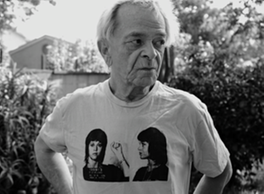Gary Indiana, "the elfin novelist, cultural critic, playwright and artist whose crackling prose and lacerating wit captured the ravages of the AIDS crisis, Manhattan's downtown art scene, lurid true crimes and his own search for love," died October 23, the New York Times reported. He was 74.
 |
|
| Gary Indiana | |
Indiana was the author of more than 10 books of fiction, memoir and criticism, "all of which tackled, in one way or another, a culture careering toward ruin," the Times noted. Horse Crazy (1989) is a roman à clef about a 30-something writer obsessed with a beautiful, young, heroin-addled photographer; Resentment: A Comedy (1997) was the first book in his lightly fictionalized crime trilogy, its backdrop the Los Angeles trial of the Menendez brothers; Three-Month Fever: The Andrew Cunanan Story (1999), delved into the bizarre life of the serial killer who murdered the fashion designer Gianni Versace; and Depraved Indifference (2001) was based on the mother-and-son con artists and murderers Sante and Kenneth Kimes.
Of the trilogy, Indiana said, "I was trying to understand something about the pathology of families."
Indiana arrived in New York City in 1978 and "began churning out poetry, film reviews and essays for indie presses, hoping to find his way as a playwright and novelist," the Times wrote. He became an impresario of the East Village's art scene, performing in a few No Wave movies, staging plays at the Mudd Club and in his friend Bill Rice's backyard, and overseeing "lunatic cabarets featuring knife juggling, fire effects and a man who ate lightbulbs (and who happened to be Mr. Indiana's boyfriend at the time)."
When his friend Jeff Weinstein became the arts editor of the Village Voice, he persuaded a reluctant Indiana to become the paper's art critic. For the next two and a half years, beginning in 1985, he upended the traditions of the form. As he wrote later, it was a time of terrible emergency, and he used his essays to explore his rage at the government's indifference to the AIDS crisis and at an art world veering from joyous eclecticism to a grimly corporate market ethos. Indiana disavowed his art criticism after he quit the Voice in 1988.
"It had made him a star in a world that he hated--the amped-up, hyper-capitalist art world," the longtime editor Ira Silverberg, once one of Indiana's publishers, said. "He was a Marxist at heart, and he retreated into fiction, which is where he wanted to be anyway."
In 2017, however, writer Bruce Hainley, who had gathered Indiana's Voice columns, gave the hard drive to Hedi El Kholti, an editor of Semiotext(e). El Kholti then persuaded "an extremely ambivalent" Indiana to allow him to publish the collection; Vile Days: The Village Voice Art Columns 1985-1988, edited by Hainley, which was released in 2018. Semiotext(e) had earlier published some of Indiana's out-of-print novels, earning him a new generation of readers.
"He was one of the very greatest writers (among other things) of the last century," Hainley said.
Indiana "understood the absurdity of everything," said author Lynne Tillman, an old friend. "So I want to phone him and tell him he died. He'd roar with laughter. What kind of man was he? It's why I write novels. If I tried to sum him up, he'd become a character."
"To continue with something, you have to take a leap of faith," Indiana told Tobi Haslett in his Paris Review Art of Fiction interview. "But there does come a point with a novel when you know you're going to get to the end. When you see how you can make it work despite there being elements of it that make you afraid."

